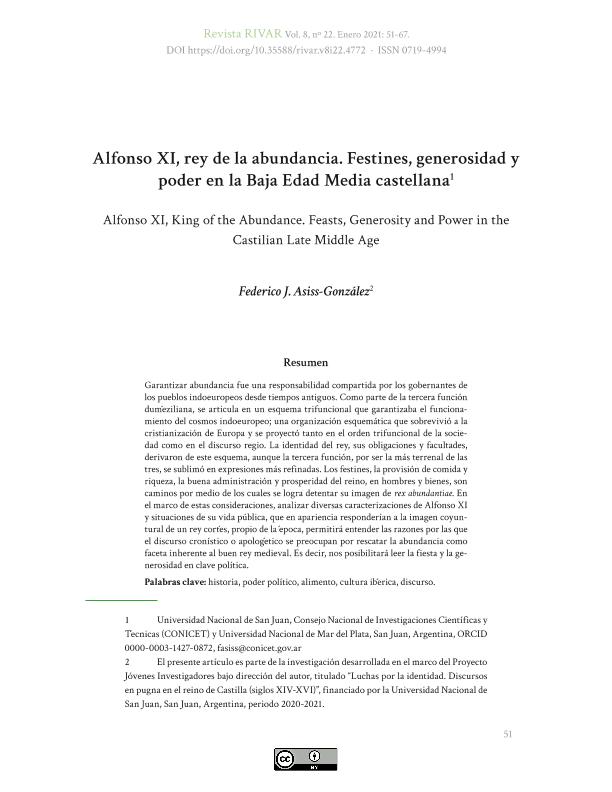Mostrar el registro sencillo del ítem
dc.contributor.author
Asiss González, Federico Javier

dc.date.available
2021-12-01T00:53:36Z
dc.date.issued
2021-01-19
dc.identifier.citation
Asiss González, Federico Javier; Alfonso XI, rey de la abundancia. Festines, generosidad y poder en la Baja Edad Media castellana; Universidad de Santiago de Chile. Instituto de Estudios Avanzados; Revista Iberoamericana de Viticultura Agroindustria y Ruralidad; 8; 22; 19-1-2021; 51-67
dc.identifier.issn
0719-4994
dc.identifier.uri
http://hdl.handle.net/11336/147805
dc.description.abstract
Garantizar abundancia fue una responsabilidad compartida por los gobernantes de los pueblos indoeuropeos desde tiempos antiguos. Como parte de la tercera función duméziliana, se articula en un esquema trifuncional que garantizaba el funcionamiento del cosmos indoeuropeo; una organización esquemática que sobrevivió a la cristianización de Europa y se proyectó tanto en el orden trifuncional de la sociedad como en el discurso regio. La identidad del rey, sus obligaciones y facultades, derivaron de este esquema, aunque la tercera función, por ser la más terrenal de las tres, se sublimó en expresiones más refinadas. Los festines, la provisión de comida y riqueza, la buena administración y prosperidad del reino, en hombres y bienes, son caminos por medio de los cuales se logra detentar su imagen de rex abundantiae. En el marco de estas consideraciones, analizar diversas caracterizaciones de Alfonso XI y situaciones de su vida pública, que en apariencia responderían a la imagen coyuntural de un rey cortés, propio de la época, permitirá entender las razones por las que el discurso cronístico o apologético se preocupan por rescatar la abundancia como faceta inherente al buen rey medieval. Es decir, nos posibilitará leer la fiesta y la generosidad en clave política.
dc.description.abstract
Securing abundance was a responsibility shared by the rulers of the Indo-European peoples since ancient times. As part of the third Dumézilian function, it was articulated in a tri-functional scheme that ensured the functioning of the Indo-European cosmos. This schematic organization survived the Christianization of Europe and was planned both in the tri-functional order of society and in the royal discourse. The identity of the king, his duties and powers were derived from this scheme, although the third function, being the earthliest of the three, was sublimated in more refined expressions. The feasts, the provision of food and wealth, the proper administration and the prosperity of the kingdom, in men and goods, are ways through which he manages to retain his image of rex abundantiae. In the context of these considerations, to analyze various characterizations of Alfonso XI and situations of his public life, which in appearance would respond to the conjunctural image of a courteous king, typical of the time, will allow us to understand the reasons why the chronicle or apologetic discourse is concerned with rescuing abundance as an inherent facet of the good medieval king. That is, it will enable us to read the feasts and the generosity in political terms.
dc.format
application/pdf
dc.language.iso
spa
dc.publisher
Universidad de Santiago de Chile. Instituto de Estudios Avanzados
dc.rights
info:eu-repo/semantics/openAccess
dc.rights.uri
https://creativecommons.org/licenses/by/2.5/ar/
dc.subject
ABUNDANCIA
dc.subject
REY
dc.subject
PODER
dc.subject
FESTINES
dc.subject
BIENES
dc.subject.classification
Historia

dc.subject.classification
Historia y Arqueología

dc.subject.classification
HUMANIDADES

dc.title
Alfonso XI, rey de la abundancia. Festines, generosidad y poder en la Baja Edad Media castellana
dc.title
Alfonso XI, King of the Abundance. Feasts, generosity and power in the castilian late middle age
dc.type
info:eu-repo/semantics/article
dc.type
info:ar-repo/semantics/artículo
dc.type
info:eu-repo/semantics/publishedVersion
dc.date.updated
2021-11-09T18:57:59Z
dc.journal.volume
8
dc.journal.number
22
dc.journal.pagination
51-67
dc.journal.pais
Chile

dc.journal.ciudad
Santiago de Chile
dc.description.fil
Fil: Asiss González, Federico Javier. Universidad Nacional de San Juan. Facultad de Filosofía, Humanidades y Artes. Departamento de Historia; Argentina. Consejo Nacional de Investigaciones Científicas y Técnicas. Centro Científico Tecnológico Conicet - San Juan; Argentina
dc.journal.title
Revista Iberoamericana de Viticultura Agroindustria y Ruralidad
dc.relation.alternativeid
info:eu-repo/semantics/altIdentifier/url/https://www.revistas.usach.cl/ojs/index.php/rivar/article/view/4772
dc.relation.alternativeid
info:eu-repo/semantics/altIdentifier/doi/https://doi.org/10.35588/rivar.v8i22.4772
dc.relation.alternativeid
info:eu-repo/semantics/altIdentifier/url/https://scielo.conicyt.cl/scielo.php?script=sci_arttext&pid=S0719-49942021000100051
Archivos asociados
